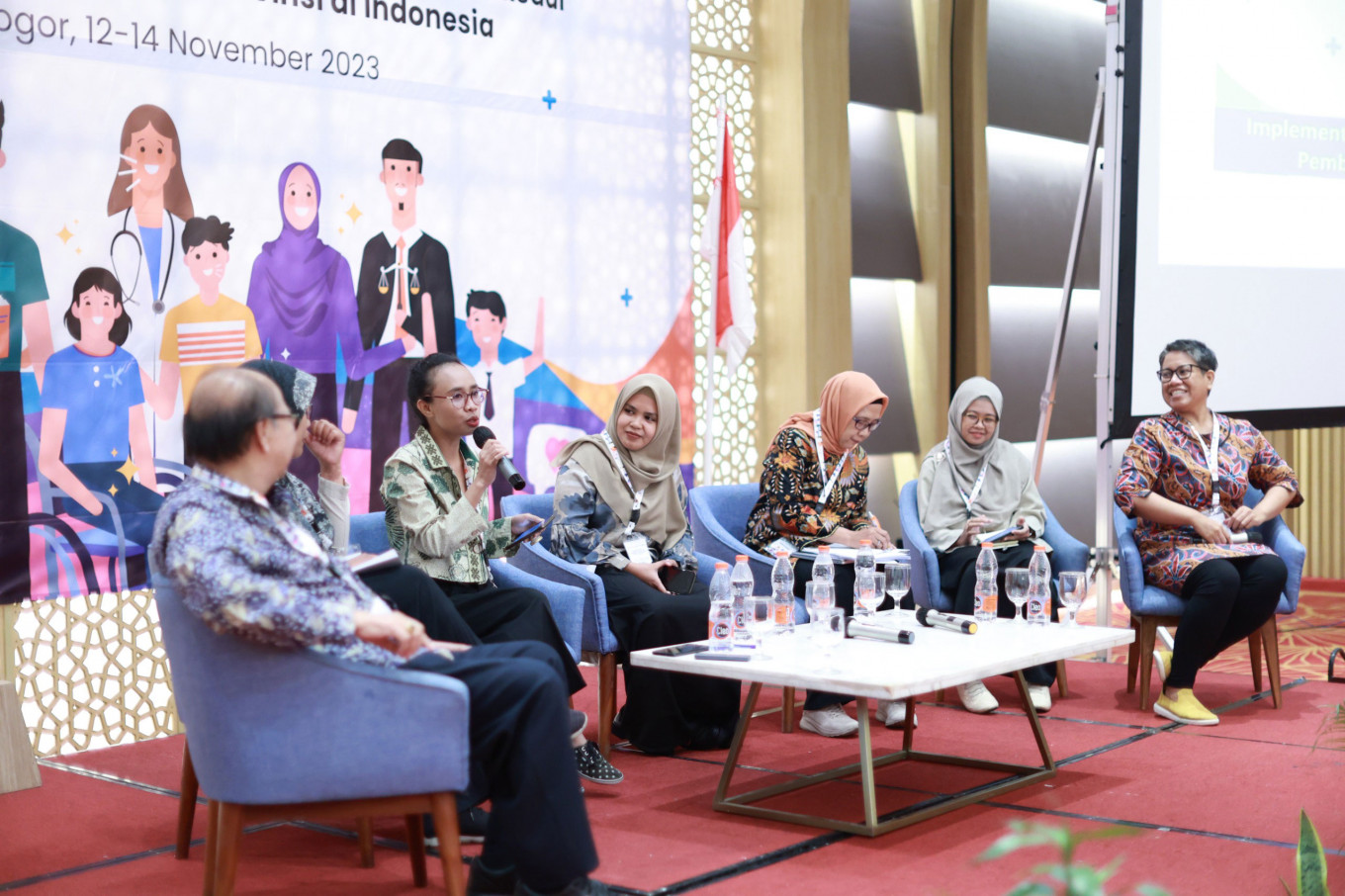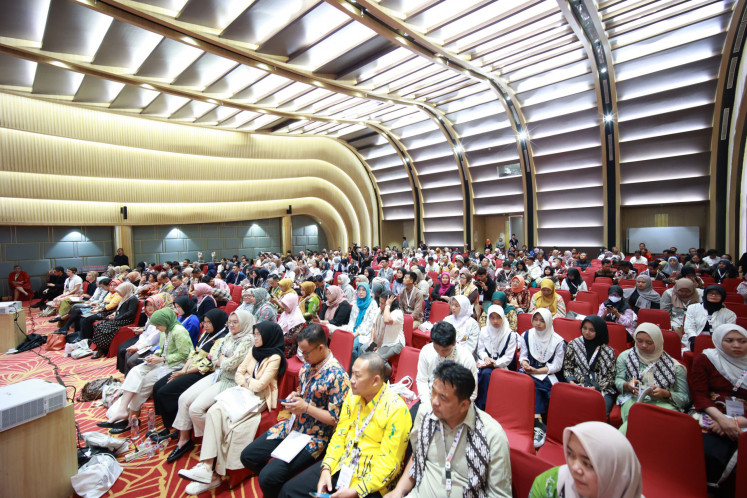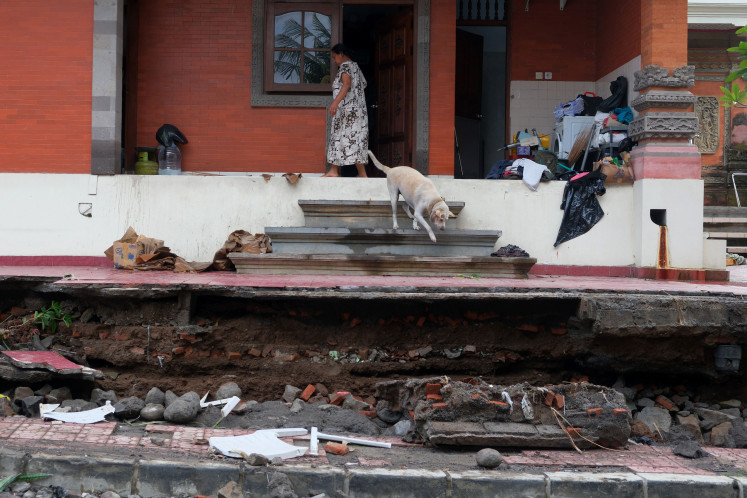Popular Reads
Top Results
Can't find what you're looking for?
View all search resultsPopular Reads
Top Results
Can't find what you're looking for?
View all search resultsInnovative approaches toward sexual and reproductive health awareness
Change text size
Gift Premium Articles
to Anyone
A
series of talk shows has revealed innovative and breakthrough approaches toward raising awareness about the rights to sexual and reproductive health (HKSR) among young people, amid emerging concerns about digital-based social media digital usage.
Tri Hastuti Nur Rochimah, general secretary of Aisyiah Islamic Boarding School (pesantren), said that in the context of Indonesia, religious values would bring about better social change, especially related to, in this case, gender justice and HKSR. “That’s what we have to believe first that religion is a social instrument that will drive change,” she said.
“Many ask questions as to why in reality Islam looks down on women. That’s not the values of Islam but how the Islamic values are interpreted,” she said.
The high maternal death rate in Indonesia was caused partly by the high rate of child marriage. “Child marriage remains rife in Malang in East Java; Jember and Probolonggo, Central Java,” she said.
According to her, the issues of gender equality, gender injustice and HKSR are not mere biological and medical issues but also “issues of culture and religious interpretation”.
She cited marriage proposals and engagement as examples of the culture. “A girl that has been proposed to is supposed to obey. If she rejects, then she will be regarded as being tidak laku [unable to find a partner]. If a girl is already engaged with a man and then the couple is caught staying in the same house, then the couple are made to perform a wedding ceremony,” she said.
According to her, discussing sex and reproductive health in public remained taboo and therefore she engaged religious figures in this regard. “Religious figures are potential agents of change as they are influential in the community. We have to embrace them and give them perspectives. I know this not easy but we have to do it continuously,” she said.
The discussion, moderated by Pera Sopariyanti, was themed “Islam, gender justice and education on sexual and reproductive health (PKRS): Islamic approaches to support gender justice”. It was part of the dialog on change accomplishment program themed, “Aware, engaged and taking action: The journey of youth along with civil society organizations in driving the fulfilment of HKSR, prevention of child marriage and sexual violence in 13 regencies, in six provinces in Indonesia.”
The event, organized by Rutgers Indonesia, took place in Bogor, West Java, on Nov. 12 – 14.
The discussion also featured Nur Diana Khalida of Tanoker and An An Aminah, a young female ulema from Rahima, as speakers.
Nur Diana was of the view that given the urgency of the issue of HKSR, transformation should be conducted continuously by involving clerics and ulema, other community figures, fathers and anyone that has the same view of the need to strengthen the role of women.
She said that based on her experience, she had to adopt a particular approach when explaining gender justice and HKRS to cleric or ulema, which was challenging.
“For example, we cannot speak bluntly about gender equality but we have to be careful […] we have to find a way to generate their interest in the issue in a comfortable manner,” she said, adding that “this approach works well.”
An An said that to maintain and strengthen her role as a transformative female ulema, she never stopped pursuing knowledge “by participating in various events wherever, like what I am doing now.”
She said it was important for those engaged in promoting understanding of gender equality and HKSR to boost their own branding so that “people will listen to what you say. If you are somebody instead of being no one, you will be counted when conveying your views or insights before the public,” she said.
An An said that Islam was Rahmatan lil alamin (a blessing for the universe) which improved akhlak (morality), encouraged mutual love and respect and mutually fulfilled needs.
Several young people also shared their best practices regarding their efforts to prevent child marriage and sexual violence in the third day of the dialogue.
Mega Puspitasari of the Koalisi Peremuan Indonesia (KPI) said that the organization coped with the issue of child marriage by, among other things, asking young married couples to delay having a child. It also prevents early marriage by asking the young couples to delay getting married given the high risk of reproductive complications.
“Along with several youth groups, the KPI is driving the issuance of a presidential regulation concerning a national strategy to prevent child marriage,” she said, which was received with applause from the audience.
Dr. Ani of the Health Ministry, who viewed early marriage from the health perspective, said that adolescents needed sufficient intakes of nutrition, zinc, protein, vitamins, carbohydrates etc for their developmental growth. “When an adolescent is pregnant, this means that she has to fight for the intake with her unborn baby,” she said when contacted separately.
“This explains why a baby born by a child or young girl can potentially lead to stunting,” she said, adding, “That’s why advocacy regarding HKSR is of paramount importance.”
Fenta Febrianta of Forum Anak Desa (FAD) revealed how the organization used arts performances as a medium for introducing gender justice and HKSR to the community in Bondowoso regency.
Initially, the local government did not support their activities, which prompted them to raise funds for the activities by themselves. “However, after finding that our activities were deemed positive, they now fully support our activities,” she said.
Sexual violence
The dialogue also revealed how efforts should continue to tackle the issue of sexual harassment and violence, which are rife in rural areas, partly driven by the misuse of digital-based social media platforms.
Salma of FKRD Garut, discussed online sexual gender-based violence involving a female student of the school, who became a victim.
According to her, the perpetrator used blackmail to enable her to obey his wishes. “He threatened her with uploading her naked photos through social media platforms unless she accepted him [as her lover],” she said.
“However, the victim reported the case to me and I immediately reported it to the school authorities,” she said.
The incident partly prompted her to prepare and design standard operating procedures (SOP) related to the prevention and handling of sexual violence, which was now ready for implementation.
The SOP aims to create a safe and comfortable pesantren, free from sexual harassment and violence. “Many students do not understand how to love and respect each other and this is what prompted me to prepare the SOP,” she said.
Female disabled students are highly vulnerable to sexual violence as disclosed in the dialogue.
A teacher from a school with disabled children said that the school lavatory was a place where sexual harassment and violence commonly occurred. “Everything goes back to each individual. Students should be cared for and protected, instead of being the target of sexual violence,” he said, referring to a case of sexual violence involving a student with an intellectual disability at his school for disabled children in Jombang.
Data from Komnas Perempuan’s CATAHU 2022, which recorded cases of violence against women over 10 years (2012-2021), showed that gender-based violence (KBG) was the highest, an increase of 50 percent in 2021, compared with the previous year or even higher than the figure recorded prior to the COVID-19 pandemic in 2019.
Several types of KBG against women drew people’s attention in 2021. They included cyber-gender-based violence (KBGS) and KBGS against women with disabilities.
The 2021 data also showed that cases of violence against women with intellectual disabilities remained the highest at 22 cases, followed by women with double disabilities at 13 cases.
Siswanto Agus Wilopo, a researcher from the Global Early Adolescent Study (GEAS), said that it would be better to have more young people in the Regional Representatives Councils (DPRD) and involve them in planning and setting policies that solve juvenile issues, including HKRS in the future.
“Everything depends on policymakers,” he said.
Since 2021, Rutgers Indonesia has implemented several adolescence-and youth-related programs, Right Here Right Now (RHRN2), Power to Youth (PtY) and Generation Gender (Gen-G) for the 2021 – 2025 working period.











